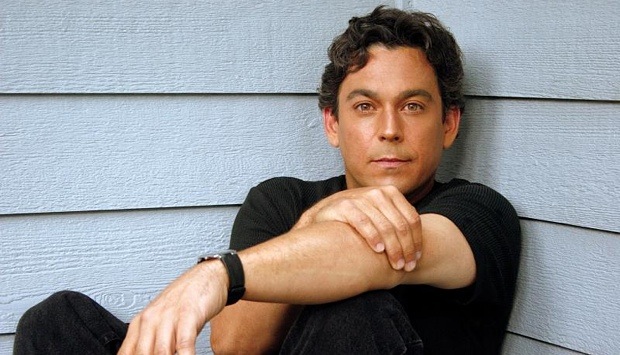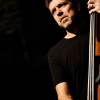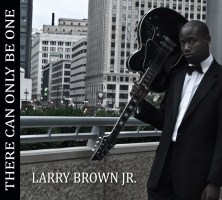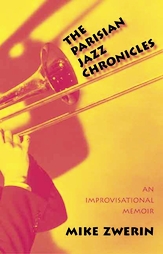Home » Jazz Articles » Interview » Joey Calderazzo: Improviser in Top Form
Joey Calderazzo: Improviser in Top Form

A man of extraordinary talent at the keyboard, he's held the piano chair in

Branford Marsalis
saxophoneb.1960

Michael Brecker
saxophone, tenor1949 - 2007
He's currently leading his own trio, while still being a vital cog in the Marsalis organization. In fact, 2011 saw the release of a duet record with Marsalis—Songs of Mirth and Melancholy (Marsalis Music)—and the recording of a new Marsalis quartet album to be released in 2012. It has no title yet, but Calderazzo is high on it.
Speaking in the fall of 2011, Calderazzo had just come off the European leg of a tour with his trio. He was about to set off again with his men—drummer

Donald Edwards
drums
Orlando le Fleming
bassb.1976
"I don't care how I feel, how tired I am, how far I traveled. I'll get up there and play," he says. "I don't look at my clock. I play. If I'm half dead, I'll play until it kills me. It could be a thousand people or one hundred people. It's the same to me. I hold a real high standard to my personal performance. I don't demand that out of my musicians because I know they're doing the best they can. Some shows are better than others."
Once thing is certain: His playing is always interesting, no matter the setting. He flies under the radar a bit in the jazz field, but to see him live—fingers flying, pushing the music, creating impressive sounds—is to know that he's one of those out there that is really doing it.
"I'm missing shows with Branford to pursue my own trio stuff, and he hasn't given me any grief," says the pianist. "He understands." Calderazzo is 46, Marsalis five years older. He calls Marsalis his best friend, a guy he's known since age 14. He was the best man at Calderazzo's wedding. "Branford and I are literally the odd couple. We are worlds apart in just about everything. He is completely well read, completely into politics. ... I'm not into politics at all. I do like history. He loves history. But Branford and I can talk for hours about life, about feelings, about relationships, about music—and just go on. And the thing that's really cool about Branford is he's an incredible listener. The other thing is I am a pain in the ass. I can be really difficult. Branford knows that about me. ... We just naturally like one another."
 Calderazzo notes, "I was really close to Michael [Brecker] also. Michael was a real hard-working guy. I learned a lot from both of these guys. The relationship I had with Michael was that of father and son. I lost my dad when I was 17, and I met Michael when I was 20. I was in his band when I was 21 or 22. I think I spoke to Michael almost every single day. I never went more than three days without speaking to Michael in the time that I knew him. I loved playing with him, but the relationship I had with him was very special."
Calderazzo notes, "I was really close to Michael [Brecker] also. Michael was a real hard-working guy. I learned a lot from both of these guys. The relationship I had with Michael was that of father and son. I lost my dad when I was 17, and I met Michael when I was 20. I was in his band when I was 21 or 22. I think I spoke to Michael almost every single day. I never went more than three days without speaking to Michael in the time that I knew him. I loved playing with him, but the relationship I had with him was very special." Brecker died in 2007, a death that affected many in the music world, as the great saxophonist had given the world so much fine music. "With any kind of tragedy, as we get older it chips away at you. Michael was a tough one," says Calderazzo. "It makes you think that maybe that shitty solo or when I turn the beat around on that blues really isn't important anymore. I'm a firm believer in the importance of the relationships that we build, both personally and musically. At the end of the day, that's really all this is about."
He says his relationship with Marsalis is one that works superbly from a musical standpoint. "After 11 years of playing with Branford, I'm still nervous to play with him. I'm comfortable, but ... And I had the same thing with Mike [Brecker]. Mike kept you on the top of your game. Whether you like the way he played or not—because I've met people who loved his playing and people who don't—but the one thing that's undeniable is his playing, his attack of the instrument, what he brought to the table. Night after night, Mike brought it. He would go to the sound checks and would sit at the venue and practice for hours. He's ready to go. Michael was a true professional. He played every performance like it was going to be his last.

"Branford's attitude is not that. It's a funny thing. My take on it is, no matter where it is, it's just another performance. The two of them are polar opposites, but it works for each one of them. It's very interesting. I've learned from both of them."
The duet record with Marsalis is one of quality, Calderazzo says, but oddly that might not be noticed by everyone. The music on it is mostly written by the two mates. The tempos are slow to medium. Marsalis' sound is typically rich, and he's always resourceful, very expressive. Bold or nuanced, brazen or thoughtful, he has the technique and artistic sensibility to cover it all. Calderazzo, for his part, shows many sides: stride-like moments on "One Way"; tender on "The Bard Lachrymose" and "Hope"; fleet and frisky on "Endymion." Throughout the disc, the conversations between the two merge in a manner that appears effortless. Each knows where the other is and where they're going. There's only one fast tune, the closer "Bri's Dance," where both are more playful.
"The thing that's cool about that tune is there are two chords to every measure. There are a lot of chord changes in that song," he explains. "It's like 'Giant Steps' with even more chords. At points, it sounds like it's free. What's cool about that is none of it's free. We don't go out of time. The time is constant: one, two, three four, one, two, three, four—with all those chords going by. But Branford and I are somewhere else. To me, that was very cool. I ran into [pianist]

Phil Markowitz
pianoThere are nine tunes on the album. "We probably didn't do more than 12 or 13 takes, total," says Calderazzo. That's how easy it is for these two partners to meld. But, "Musicians probably wouldn't like it because there's not enough flash. It's simple. It's melody driven. There's not enough slick shit on there for musicians to be wowed by. I love that about Branford. He doesn't make records for musicians. It's a documentation of whatever. ... My wife will listen to that record and love it. She'll put it on and say, 'I love this song. It's beautiful.' I have some friends that are musicians that like 'beautiful' music. They're, like, 'That duo shit with Branford is really nice.'"
 Retakes weren't usually necessary, and produced not much more than different music, not better. Calderazzo is comfortable with that approach.
Retakes weren't usually necessary, and produced not much more than different music, not better. Calderazzo is comfortable with that approach. "The one place where my playing has really changed has been my attitude toward stuff. Once again, the difference between Mike and Branford: Mike would spend hours fixing stuff on his records, where Branford leaves all the mistakes on. I still don't know. I can go both ways," says Calderazzo. "I co-produced Two Blocks From the Edge (GRP, 2003) with Mike. I would have done anything for Michael at any time in my life. But I told Mike in jest, 'Don't ever ask me to do anything like this again with you.' Mike was a real studio musician. If he played a bad note, he fixed it. ... One thing I've learned is, if you have to do more than two or three takes, then you ain't getting it."
Recording the new Marsalis quartet record with bassist

Eric Revis
bassb.1967

Justin Faulkner
drums Calderazzo says the resulting album "is really a good record." He adds, "Two days we went in and knocked it out. And it sounds great." He also has strong praise for the relatively new drummer, Faulker, who has been part of the band for several months now. Says Calderazzo, "Part of the jazz scene is: you have talent, but you don't have direction. Everybody is ... I don't know what the word is. People are striving so hard to be different. Or they're not complete. They haven't checked out enough jazz, so they're playing just enough to get by. This kid [Faulkner] came into this band with a certain kind of energy. Eric [Revis] has been so helpful. [Pianist]
Calderazzo says the resulting album "is really a good record." He adds, "Two days we went in and knocked it out. And it sounds great." He also has strong praise for the relatively new drummer, Faulker, who has been part of the band for several months now. Says Calderazzo, "Part of the jazz scene is: you have talent, but you don't have direction. Everybody is ... I don't know what the word is. People are striving so hard to be different. Or they're not complete. They haven't checked out enough jazz, so they're playing just enough to get by. This kid [Faulkner] came into this band with a certain kind of energy. Eric [Revis] has been so helpful. [Pianist] 
Orrin Evans
pianob.1975
"The way I like to play with my trio, I might play one tune. It might be fast one night, it might be a ballad another night, it might be a straight-eight tune. I might play a tune and it has 40 chord changes, but one night I might play all over the chords, the next night I might find a vamp and play on that. The guys gotta follow me. When Justin joined [Marsalis' band], I've said one thing to Justin: 'Don't get comfortable, don't find a part, don't play the same shit every night. I want you to change every day. Don't play anything the same. Ever.'"
Calderazzo says more young musicians could use some direction. "I respect and am aware of all the musicians that are out there today. I don't live in New York anymore, but I spend hours on YouTube and I know exactly what

Gerald Clayton
piano
Aaron Parks
drumsb.1983

Aaron Goldberg
piano
Kevin Hays
pianob.1968
"When I came up, the generation before me was

Mulgrew Miller
piano1955 - 2013

Kenny Kirkland
piano1955 - 1998

Herbie Hancock
pianob.1940

Chick Corea
piano1941 - 2021

Keith Jarrett
pianob.1945

McCoy Tyner
piano1938 - 2020

Brad Mehldau
pianob.1970

Wynton Kelly
piano1931 - 1971

Wayne Shorter
saxophone1933 - 2023
 "To me, there's somewhat of a musical disconnect. If he continues to grow, a guy that will really have the potential to be really special is
"To me, there's somewhat of a musical disconnect. If he continues to grow, a guy that will really have the potential to be really special is 
Gerald Clayton
piano
John Clayton
bassb.1952

Oscar Peterson
piano1925 - 2007

Benny Green
pianob.1963
"But you know what's really good? Herbie's playing on Four n' More [by

Miles Davis
trumpet1926 - 1991

Bill Evans
piano1929 - 1980

George Shearing
piano1919 - 2011

Nat King Cole
piano and vocals1919 - 1965
Further examining the youth movement, Calderazzo opines, "There's all this straight-eight music now, and a kind of harmony has taken over. You have guys that want to be different, so they write all these songs in odd meters, or they want to play standards, but they don't want to swing, so they play a standard in 7/4 instead of just playing it in 4/4. Which is fine. Who am I to tell people how they should play? But for my own thing, I have spent countless hours trying to comprehend how Herbie was able to play like that at that age. It's that good: the lines, the harmony, the comping—every aspect. So [nowadays] Blue Note Records will sign a guy and say he's the next genius? Come on.
center>

"Take somebody like Eldar, who's a hell of a pianist. But he's had to do all of this on his own. He didn't have an

Art Blakey
drums1919 - 1990

Elvin Jones
drums1927 - 2004

Wynton Marsalis
trumpetb.1961

Joe Henderson
saxophone1937 - 2001

Freddie Hubbard
trumpet1938 - 2008

Woody Shaw
trumpet1944 - 1989
Calderazzo himself had a variety of influences while growing up in New Rochelle, New York, north of the Big Apple. He started studying piano at about the age of 7. At age 14, he was in a rock band led by his brother, Gene. "I was always the youngest in every group. This band I was in, I actually had to get a written note from my mother just to play in this bar. The guitarist went to Berklee and came back and was into jazz. Being that I was 14 and they were 18, they all went to Berklee, and I used to go visit them. That's where I met Branford. I met

Walter Beasley
saxophone
Donald Harrison
saxophone, altob.1960

David Kikoski
pianob.1961

Jeff Tain Watts
drumsb.1960

Miles Davis
trumpet1926 - 1991

John Coltrane
saxophone1926 - 1967

Red Garland
piano1923 - 1984
From Miles, it was Coltrane and McCoy Tyner, who "was really an instant pull because it had that power." Calderazzo explains, "My favorite band was Led Zeppelin, because I loved powerful rock bands. So McCoy was cool—like Led Zeppelin, but jazz. Then we go backwards. It's Monk. I really liked Red Garland playing 'Billy Boy' on Milestones. So let me go buy a couple Red Garland records. Then it's Wynton Kelly, and somebody goes, 'Do you know this record?' And I go out and buy that record. I really liked Bill Evans. I loved—and still to today think it's as close to perfect as music can possibly get—a record called Circle in the Round (Columbia, 1979). It was 'Love For Sale.' It starts out with Bill playing an intro. It's Trane, Cannonball, Bill Evans and Miles. It is absolutely amazing. So I go out and buy Bill Evans albums. Live at the Village Vanguard, Everybody Digs Bills Evans (Riverside, 1958), you know."
 Still a teenager, Calderazzo was jamming with some heavy hitters at the age of 17. A few years later, he met Brecker at a clinic.
Still a teenager, Calderazzo was jamming with some heavy hitters at the age of 17. A few years later, he met Brecker at a clinic. 
Kenny Kirkland
piano1955 - 1998
"When I joined Mike's band. I didn't have any of his records. My musical influences were Miles and Herbie and Chick and Keith and McCoy and

Sonny Rollins
saxophoneb.1930
The '90s saw more Calderazzo albums, while he continued to work with Brecker. He even was part of the funky Marsalis band, Buckshot Le Fonque, touring for a short while with the group. It wasn't the type of music he preferred, and he left the unit. It was 1998 when Marsalis' excellent pianist Kirkland died. Calderazzo was asked to step in, and has been there ever since. But he's continued to investigate jazz music and explore its possibilities. He's determined to keep growing.

"I joined Branford's band. He starts playing 'Mood Indigo' as an encore every night, and I never really checked out swing music. Now I'm out buying

Duke Ellington
piano1899 - 1974

Jelly Roll Morton
piano1890 - 1941
The pianist is still digging playing with Marsalis, but has enjoyed other sideman gigs with other top-notch jazz artists over the years. "It's been a neat thing for me as a sideman. I kind of changed both quartets that I was in. Mike [Brecker] played a lot of my music. Branford is playing my tunes. The communication relationship of what goes on has been developed, and Branford and I have a musical identity together, which is pretty neat.
"When I look back at what my career is, I did albums for Blue Note. My solo career could have been in a different place than it currently is, but I have no regrets and wouldn't change it, because of the music I've made with both Branford and Mike, and those personal relationships as well. It's been wonderful for me. All these years, I've been able to play music that I love playing, and I make a living. I own a house; I have a family. I made a career of playing whatever I want to play. It's pretty neat. I feel kind of lucky. I can bring in a tune to Branford Marsalis and he'll say, 'That's great. Let's record it.' That's pretty cool."
Between the Marsalis quartet and his own trio, the pianist has been booked solid. 2012 will see duo gigs with Marsalis, as well as quartet tours supporting the new recording. And there will be trio activity, including a live recording of his unit, that will likely be released. Calderazzo wants the trio to become well known, to stand out as one of the fine working trios on the scene.
He says, "Nobody knows who [Donald] Edwards is, and the guy is fucking great— not flashy, but a great musician. I met him when we needed a drummer to play with Branford one night. Eric [Revis] recommended him. Donald came and played great. I remember thinking it would be really fun to play with him in a trio.
"What I like about playing trio is: it's not a power trio. Everything I've been more known for doing is on the powerful side. Branford's band is still a hard hitting, pretty powerful group. My trio is very loose, very spontaneous. I'll play bebop tunes. I play 'Confirmation' every night. We do shit like that. I have a couple originals I like playing. I'll be on the road listening to Ahmad Jamal's trio and I'll come in and say, 'Let's play this like Ahmad's group.' That's what I do with the trio. It's fun. It's lighter. We can do gigs without any monitors, because Donald's dynamic range is huge. It's another musical outlet for me."
As for a possible trio album, he notes, "I've never put out a live record before, so part of me likes that. Part of me likes the idea that we're stretching and searching. ... I might look into editing some of it, I don't know. It's done. It's a question of putting it out."
Meanwhile, Calderazzo's strong chops and keen sense to explore night by night will be enhancing any setting where he might be found.
Selected Discography
Branford Marsalis/Joey Calderazzo, Songs of Mirth and Melancholy (Marsalis Music, 2011)
Joey Calderazzo, Amanecer (Marsalis Music, 2007)
Branford Marsalis, Braggtown (Columbia, 2006)
Joey Calderazzo, Haiku (Marsalis Music, 2004)
Branford Marsalis, Footsteps of Our Fathers (Columbia, 2002)
Joey Calderazzo, Joey Calderazzo (Columbia, 2000)
Michael Brecker, Two Blocks from the Edge (Impulse, 1998)
Joey Calderazzo, The Traveler (Blue Note, 1992)
Joey Calderazzo, To Know One (Blue Note, 1991)
Joey Calderazzo, In the Door (Blue Note, 1990)
Photo Credits
Pages 1, 5: Courtesy of Dog and Pony Industries
Page 2: Hans Speekenbrink
Page 3: Courtesy of North Sea Jazz Festival
Page 4: Arkady Mitnik
Tags
Joey Calderazzo
Interview
R.J. DeLuke
United States
Branford Marsalis
Michael Brecker
Donald Edwards
Orlando le Fleming
Phil Markowitz
Eric Revis
Justin Faulkner
Orrin Evans
Gerald Clayton
Aaron Parks
Aaron Goldberg
Kevin Hays
Mulgrew Miller
Kenny Kirkland
Herbie Hancock
Chick Corea
Keith Jarrett
McCoy Tyner
brad mehldau
Wynton Kelly
Wayne Shorter
John Clayton
oscar peterson
Benny Green
Alexander
Miles Davis
Bill Evans
George Shearing
Nat "King" Cole
Eldar
Art Blakey
Elvin Jones
wynton marsalis
Joe Henderson
Freddie Hubbard
Woody Shaw
Walter Beasley
Donald Harrison
David Kikoski
Jeff Watts
John Coltrane
Red Garland
Sonny Rollins
duke ellington
Jelly Roll Morton
Comments
PREVIOUS / NEXT
Joey Calderazzo Concerts
Sep
14
Sun
Jazzfest White Plains
ArtsWestchester's Arts ExchangeWhite Plains, NY
Sep
14
Sun
Jazzfest White Plains
ArtsWestchester's Arts ExchangeWhite Plains, NY
Sep
28
Sun

Branford Marsalis Quartet
Zellerbach TheatrePhiladelphia, PA
Support All About Jazz
 All About Jazz has been a pillar of jazz since 1995, championing it as an art form and, more importantly, supporting the musicians who make it. Our enduring commitment has made "AAJ" one of the most culturally important websites of its kind, read by hundreds of thousands of fans, musicians and industry figures every month.
All About Jazz has been a pillar of jazz since 1995, championing it as an art form and, more importantly, supporting the musicians who make it. Our enduring commitment has made "AAJ" one of the most culturally important websites of its kind, read by hundreds of thousands of fans, musicians and industry figures every month.






 Buy Now
Buy Now























